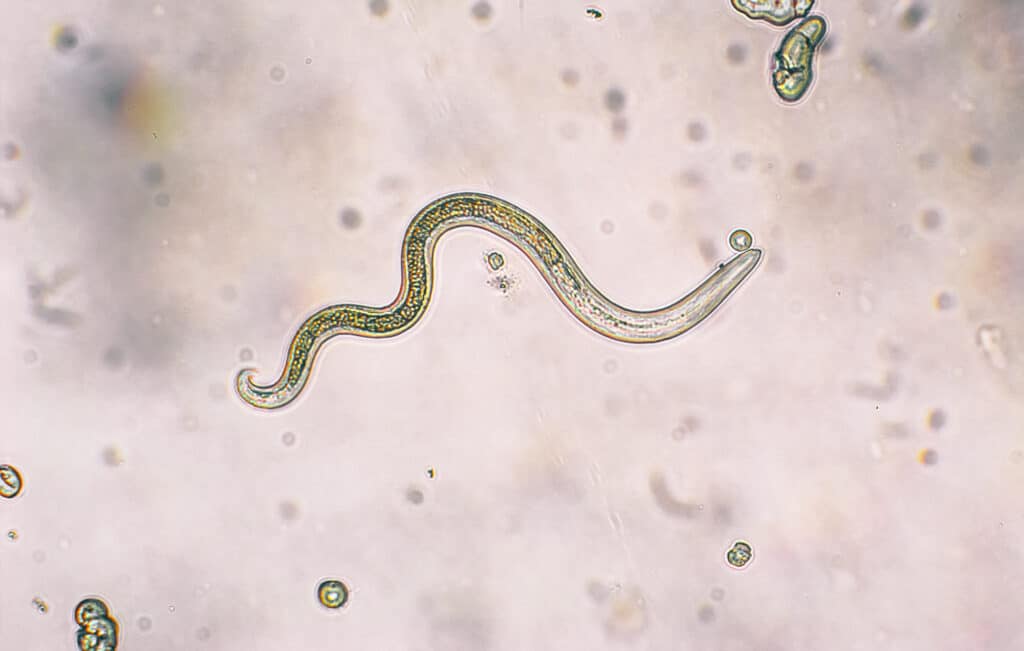Roundworms are one of the most common intestinal parasites we see in our canine friends. Dogs of all ages can get roundworms, which cause a slew of GI symptoms that impact health and daily comfort. Roundworms are an invader we want to protect our dogs from, but they can threaten our own health as well.
Dogs can spread roundworms to humans, so it’s important to be aware of all the details surrounding these intestinal parasites. We want to help you keep everyone in your home safe, so let’s discuss everything you need to know about roundworms below!
What Are Roundworms?

second stage larvae hatch from eggs in a microscope. Toxocariasis, also known as Roundworm Infection, can cause disease in humans.
©iStock.com/dotana
Before we dive into the details of how roundworms spread from dogs to people, we should first introduce you to what roundworms are in the first place. Roundworms (ascarids) are intestinal parasites that exist in the world around our pups. They invade the digestive and intestinal systems once they infect a dog. Roundworms are the most common intestinal parasite around the world, so this means they are a common threat that you should always be aware of.
How Do Dogs Get Roundworms?
So how do these intestinal critters make their way into your dog’s body? There are a few different ways that dogs catch roundworms, so let’s break down each transmission method below.
The first way that dogs become infected with roundworms is by coming in contact with infected stool. This typically involves them either sniffing or consuming another dog’s infected poop, which ultimately allows the roundworm eggs to enter your dog’s body and begin their maturation cycle.
The next way that dogs come in contact with roundworm eggs is by consuming infected soil. This often happens when a dog begins to dig in an area where infected stool once was, as the eggs of the roundworms can still be present. The digging dog will either consume the infected soil while they are digging, or they will lick their paws while grooming afterward.
Dogs can also get roundworms if they consume an animal that is infected. This can include birds, rodents, worms, and even cockroaches. Roundworms can create cyst-like pockets throughout the body of an infected animal. Once the dog eats the infected animal, it introduces the roundworms to their digestive tract.
Puppies can become infected with roundworms when they are growing in the uterus of an infected mother, or through the infected mother’s milk. Roundworms can both cross the placental barrier and enter the mammary glands, which can lead to symptoms of a roundworm infection within two weeks of the puppy being born.

A single dog roundworm, or
Toxocara canis, on the grass crawling away from a puppy’s vomit. If your dog is acting sick, check their vomit or stool for any roundworms.
©iStock.com/Michael Edwards
What Are the Signs Of Roundworms in Dogs?
We always recommend testing your dog’s stool as a puppy and twice a year once they grow out of puppyhood, but you should also be on the lookout for a roundworm infection as well. Due to the fact that roundworms will invade the digestive system in our canine friends, most of their symptoms will involve some form of GI upset.
Some of the most common signs of roundworms in dogs include:
- Diarrhea
- Blood diarrhea
- Stool that contains white or light brown worms
- Vomiting
- Vomiting that contains worms
- Pot-bellied appearance
- Weight loss
- Dull coat
- Coughing
- Changes in appetite
If you notice any of these symptoms of roundworms in your dog, we suggest taking them to your veterinarian for a fecal test. Your vet can examine their stool under a microscope and prescribe an appropriate deworming medication.
How Do You Treat Roundworms in Dogs?
Treating roundworms in dogs is typically very easy and effective. Once your veterinary team identifies the type of egg that is in your dog’s stool, they can prescribe a medication that your dog takes orally for the next 5-7 days. This medication will typically be some form of fenbendazole, and your vet will prescribe an appropriate dose based on your dog’s weight and the number of roundworm eggs seen on the microscope. Most dogs only need one round of treatment, but your vet may suggest coming back in a month to have the stool tested one more time.

Medications like Heartgard can protect your dog against parasitic worms.
©ThamKC/Shutterstock.com
Your dog’s monthly heartworm prevention is also a wonderful way to prevent any roundworm infections in the future. Most heartworm medication contains a small amount of deworming medication that will take care of any worm infections once they happen, such as roundworms. So, your pup should be safe from these critters if they are taking a monthly heartworm preventative.
Can Humans Get Roundworms From Dogs?
Yes, humans can get roundworms from dogs if they come in contact with their infected stool or infected soil. You cannot get roundworms by simply cuddling your dog or being around them, but there is a risk if you are in contact with their poop. This is why roundworms are most often spread to children, as they are most likely to be playing in potentially infected soil.
If an adult or a child consumes any infected soil, they can develop a roundworm infection in some cases. The roundworms will not be able to complete their full life cycle within the human body, but they can still lead to significant illness if they are left untreated. This is why it is so important to not only pick up after your dog when they poop in your yard (especially if they have roundworms), but to also prevent children from playing in the dirt.
It is important to keep in mind that you can often easily prevent getting roundworms by simply practicing good hygiene. You can generally avoid roundworm infections by washing your hands regularly, keeping your hands away from your mouth if you have touched soil, washing your vegetables thoroughly, and not drinking from any unknown water sources. You should also practice extra caution when picking up your dog’s poop if you know they have roundworms.

Don’t worry, you cannot get roundworms from just being around your dog. However, if your dog is infected, you can get roundworms if you handle your dog’s stool or infected soil.
©Mila Supinskaya Glashchenko/Shutterstock.com
What Are the Signs Of Roundworms in Humans?
Roundworms from dogs might not be able to complete their life cycle inside of the human body, but they can still make us sick. If you have a dog that was diagnosed with roundworms and you want to make sure your child is free of any harm, we suggest keeping an eye out for the symptoms below.
The most common symptoms of roundworms in humans include:
- Abdominal discomfort
- Diarrhea
- Vomiting
- Bloody stool
- Persistent coughing
- Shortness of breath
- Lethargy
- Weight loss
- Worms in the stool
Another thing to keep in mind is that if your dog was diagnosed with roundworms and you are concerned about your health or your child’s health, you can always reach out to your doctor for guidance. Once you explain the situation and the activities that could have put anyone in the home at risk, your doctor can decide if it is best to just treat preemptively.
How Do You Treat Roundworms in Humans?
Similar to roundworm infections in dogs, roundworms in humans can also be treated with deworming medication. The most common deworming agent is either albendazole or mebendazole, and most adults and children only need to take the medication for a few days. Once the worms are diagnosed, treatment is typically straightforward and effective.
Final Thoughts
Roundworms are something we should be educated on not only for the sake of our dog’s health, but for ours as well. This is especially important if you have any children in your home, as they are more likely to come in contact with infected dirt or soil. The best ways to prevent anyone in your home from becoming infected with roundworms is by scheduling a fecal test for your dog a minimum of once a year, keeping them on monthly heartworm prevention since it prevents most parasites, and cleaning up your dog’s poop in your yard regularly.
Up Next:
- Can You Get Worms From Dogs? What Science Says
- The 6 Most common ways dogs get worms (and how to prevent them)
- The 5 Signs Your Dog Has Heartworms, and How to Help Them Heal
The photo featured at the top of this post is © iStock.com/dotana
Ready to discover the top 10 cutest dog breeds in the entire world?
How about the fastest dogs, the largest dogs and those that are -- quite frankly -- just the kindest dogs on the planet? Each day, AZ Animals sends out lists just like this to our thousands of email subscribers. And the best part? It's FREE. Join today by entering your email below.
Sources
- Mayo Clinic, Available here: https://www.mayoclinic.org/diseases-conditions/ascariasis/symptoms-causes/syc-20369593
Thank you for reading! Have some feedback for us? Contact the AZ Animals editorial team.






